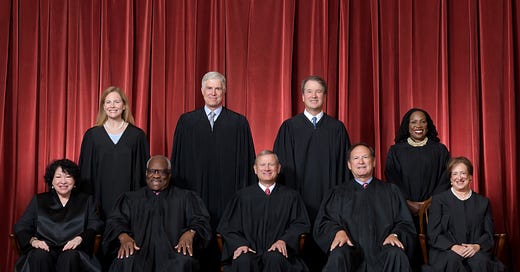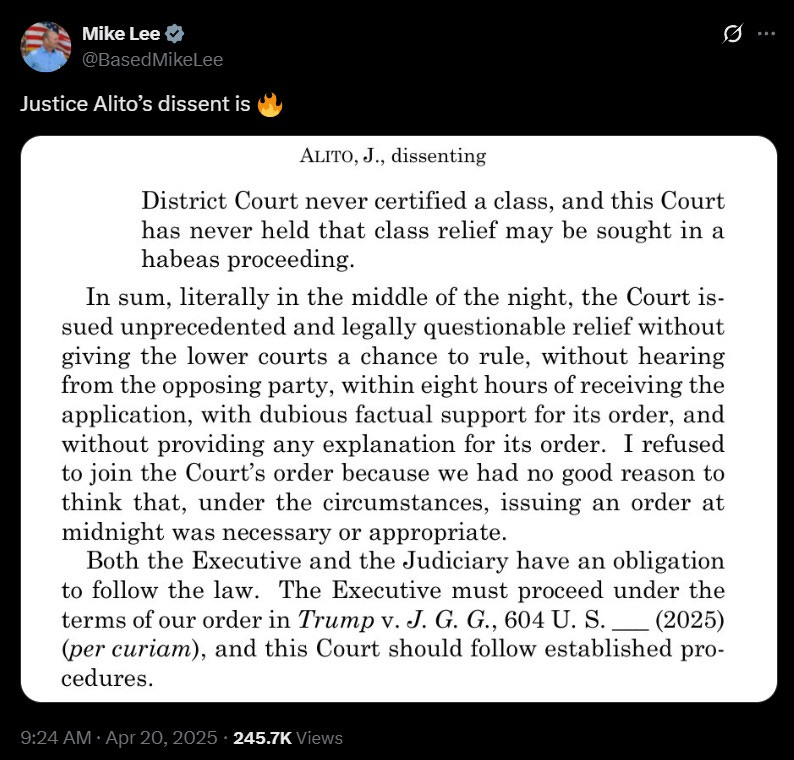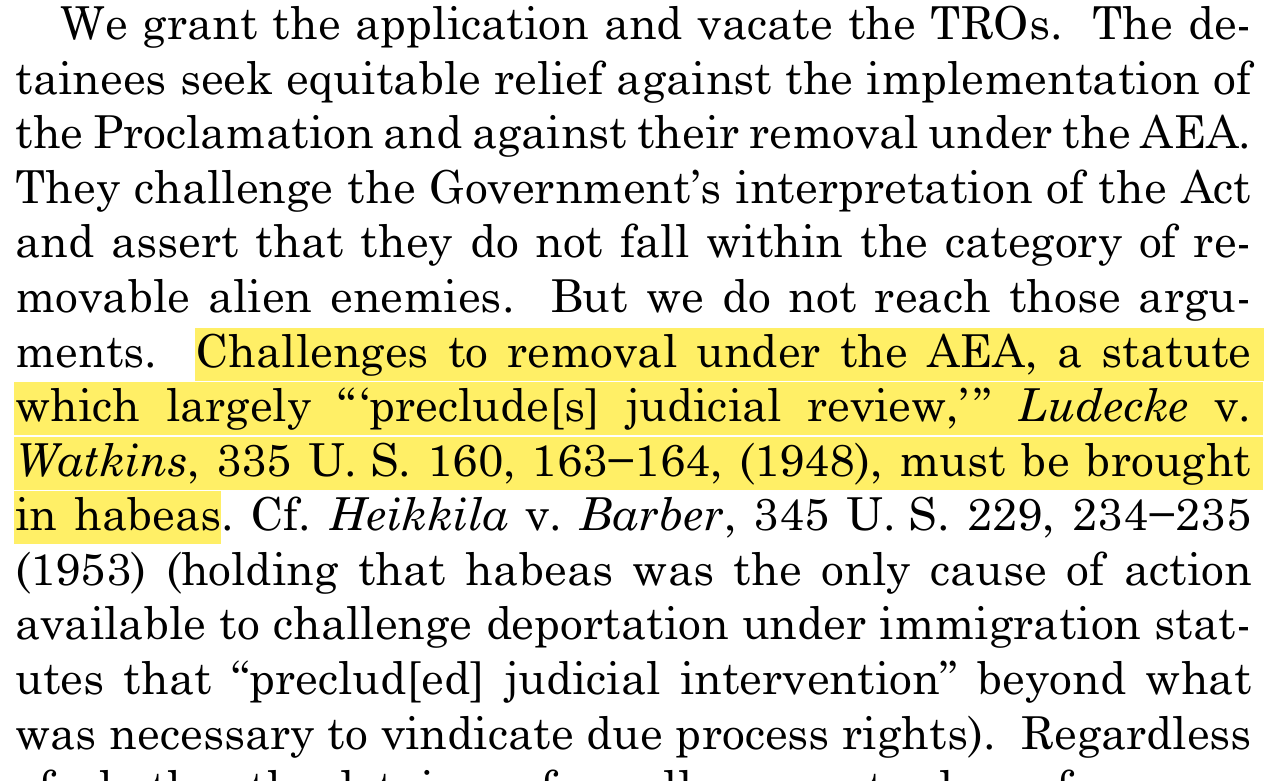Why Is the Supreme Court Protecting Violent Foreign Gangs?
"This is judicial tyranny. And the Congress must take bold action to stop it before there is a full-blown constitutional crisis."
In a dead of night ruling, the Supreme Court once against struck a blow against the president’s authority to deport criminal aliens under the Alien Enemies Act.
The Supreme Court on Friday night issued a temporary halt to the Trump administration’s effort to deport members of the violent Venezuelan gang Tren de Aragua (TdA) under the Alien Enemies Act of 1798.
"The Government is directed not to remove any member of the putative class of detainees from the United States until further order of this Court," the justices said in a brief, unsigned decision.
Justices Clarence Thomas and Samuel Alito publicly dissented from the decision, issued around 12:55 a.m eastern time.
The move comes despite clear precedent that the law falls under presidential authority—not judicial oversight.
Legal experts note the inconsistency: the Court openly admits the Alien Enemies Act isn’t subject to judicial review—yet it still intervened to delay enforcement.
As legal journalist Julie Kelly pointed out on War Room, “They’ve all admitted the Alien Enemies Act is not subject to judicial review.” Yet courts keep stepping in—seemingly only when Trump is the one exercising the law.
Kelly notes the ACLU’s strategy involved rushing emergency filings and trying to expand temporary protections for a few plaintiffs into broad class-wide orders. A Texas judge rejected that move, and an appellate court backed him up, criticizing the ACLU’s tactics.
Just like the case before Jeb Boasberg, ACLU filed a suit seeking a temp restraining order for a few anonymous plaintiffs... then immediately asked the judge to convert the anonymous plaintiffs into a class-wide TRO... The Texas judge in this case denied TRO and class certification... SCOTUS cited 'putative' class.
In his order, Hendrix AGAIN noted the judicial branch’s lack of authority in reviewing the president’s issuance of the Alien Enemies Act. SO WHAT EXACTLY ARE WE DOING HERE?”
Judge Matthew Kacsmaryk in Texas, who reviewed the ACLU's challenge, again affirmed that courts have limited authority under Article III to override executive actions in national security matters. Even Boasberg himself admitted in earlier rulings the judiciary’s role is “circumscribed” in foreign policy and wartime decisions.
Bottom line: Trump’s use of a lawful, centuries-old authority is being undermined—not by legal precedent, but by political resistance dressed up as judicial review.
So why is the Supreme Court interfering?
President Trump invoked the Alien Enemies Act on March 15 to expedite the removal of TdA operatives, who entered the U.S. illegally in 2023. The Act, originally passed in the 18th century, gives the president wartime powers to act against nationals of hostile entities. Trump’s move came alongside broader executive orders targeting illegal immigration and naming groups like MS-13 and Mexican drug cartels as foreign terrorist organizations.
Under President Biden, border encounters surged into the millions, according to CBP data. Yet as of February 25, Secretary Kristi Noem reported just 200 apprehensions at the border—the lowest single-day number in 15 years—thanks to renewed enforcement under Trump’s reinstated policies.
On Friday, in a separate ruling, a divided federal appeals court panel temporarily halted U.S. District Judge James Boasberg’s contempt proceedings against the Trump administration over its deportation flights to El Salvador last month.
A lower court judge, James Boasberg in D.C., attempted to block the deportation flights, even though none of the detainees were within his jurisdiction. The Supreme Court overturned Boasberg’s order on April 7 in a 5-4 decision citing lack of jurisdiction.
Yet, here we are. This is clearly the activist judges’ strategy: Delay and obstruct the Trump administration through judicial activism in order to protect criminal aliens from deportation back to their home countries.
Thomas Jefferson himself powerfully warned against the dangers of an unbridled judiciary in a letter to William Constance in 1815:
The 2d question whether the judges are invested with exclusive authority to decide on the constitutionality of a law, has been heretofore a subject of consideration with me in the exercise of official duties. certainly there is not a word in the constitution which has given that power to them more than to the Executive or Legislative branches. questions of property, of character and of crime being ascribed to the judges, through a definite course of legal proceeding, laws involving such questions belong of course to them; and as they decide on them ultimately & without appeal, they of course decide, for themselves, the constitutional validity of the law. on laws again prescribing executive action, & to be administered by that branch ultimately and without appeal, the Executive must decide for themselves also, whether, under the constitution, they are valid or not. so also as to laws governing the proceedings of the legislature, that body must judge for itself the constitutionality of the law, & equally without appeal or controul from it’s coordinate branches. and, in general, that branch which is to act ultimately, and without appeal, on any law, is the rightful expositor of the validity of the law, uncontrouled by the opinions of the other coordinate authorities. it may be said that contradictory decisions may arise in such case, and produce inconvenience. this is possible, and is a necessary failing in all human proceedings.
This nearly unprecedented judicial activism may take bold, decisive action in order to put a halt to it. Such action was taken under former President Thomas Jefferson.
Former Republican Speaker of the House Newt Gingrich in early April made a powerful and eloquent argument that the Congress needs to take such action to stop a “constitutional crisis” from forming.
"The notion that unelected lawyers can micromanage the executive branch & override a commander-in-chief who received 73 million votes should trouble every American," he said.
“There is clearly a potential constitutional crisis involving the judicial branch's effort to fully override the legislative and executive branches,” Gingrich continued. “15 district judges effectively seize control of various executive branch duties in the first 6 weeks of the current presidency through nationwide injunctions.”
“This is potentially a judicial coup d'etat,” he added. “It clearly violates the constitution and more than 200 years of American history.”
“President Jefferson concluded that impeaching the judges would take too much time,” he continued. “He and the Congress simply abolished the courts in which they served via the Judiciary Act of 1802. This is a constitutional balance of power. The legislative and executive branches can reshape the judiciary branch. It is a useful reminder in considering the current situation unelected lower court judges have been steadily grabbing power for years.”
Former Speaker Gingrich, of course, is speaking of the Judiciary Act of 1801, which expanded the courts, and then-Republicans’ repeal of the act in 1802.
The Federal Judiciary Center explains this history, which appears to have been forgotten by the modern Republican Party:
Republicans were strongly opposed to the 1801 Act, particularly because the Federalists enacted it during a lame-duck period following a decisive electoral defeat. In Republicans’ view, the new circuit judgeships were a Federalist ploy to pack the federal courts with political allies. As a result, the circuit judges Adams appointed just before leaving office came to be known as the “midnight judges,” a pejorative term reflecting the last-minute nature of their appointments and casting doubt on their legitimacy. Republicans also saw the Federalists’ bolstering of federal judicial power as a way to weaken the elected branches of government just as the Republicans were poised to assume control. The controversial prosecutions of Republicans under the Sedition Act of 1798 made them especially wary of strong federal courts staffed by Federalist judges. […]
With the Republicans in the majority, Congress passed the repeal act on March 8, 1802, approximately thirteen months after the 1801 Act became law, restoring the organization of the federal courts that existed prior to 1801. In April, Congress followed up with the Judiciary Act of 1802, which eliminated the Supreme Court’s next term—to prevent the Court from ruling on the constitutionality of the repeal, some alleged—and assigned the justices to ride the circuits again. In private letters, the justices discussed among themselves whether circuit riding, which placed them on courts to which they had not been appointed, was unconstitutional. But ultimately, the Court accepted the majority’s view that the practice should continue.
The judges who were removed from office by the repeal of the 1801 Act petitioned Congress to be assigned to new judicial duties and paid their salaries, but Congress took no action on their request. Legal challenges to the constitutionality of the repeal ended with the Supreme Court’s decision in Stuart v. Laird (1803), in which the Court held that Congress had the authority to transfer a case from a court established under the 1801 Act to a court created under the 1802 Act.
In other words, the rogue judges who are obstructed the executive branch’s policies, which rely on duly passed laws, such as the Alien Enemies Act of 1798, as well as the nation’s immigration laws, can simply be removed by having the acts that brought their courts into being repealed.
It is an open mystery why Speaker Mike Johnson has not more persuasively threatened the activist judges with this potent remedy.
The Hoover Institution has offered additional solutions to this problem of activist judges issuing nationwide injunctions to interfere with constitutionally delegated executive action.
James Madison wrote in The Federalist Papers that to combine judicial power with executive and legislative authority was "the very definition of tyranny," and Thomas Jefferson believed that allowing only the unelected judiciary to interpret the Constitution would lead to judicial supremacy. "It is a very dangerous doctrine to consider the judges as the ultimate arbiters of all constitutional questions," said Jefferson. "It is one which would place us under the despotism of an oligarchy."
Unfortunately, the federal judiciary has strayed far beyond its proper functions, in many ways validating Jefferson's warnings about judicial power. In no other democracy in the world do unelected judges decide as many vital political issues as they do in America. We will never return the federal government to its proper role in our society until we return the federal judiciary to its proper role in our government. […]
Congress should exercise its power to limit the jurisdiction of the courts. The Constitution provides that Congress is authorized to establish those federal courts subordinate to the Supreme Court and set forth their jurisdiction. Congress also has the power to limit the jurisdiction of the Supreme Court and regulate its activities. Accordingly, Congress should exercise this authority to restrain an activist judiciary.
The American people elected President Donald Trump to carry out his constitutionally delegated authority to enforce the nation’s laws, including immigration laws. The electorate also has backed the president’s mandate with a Republican majority to carry out the will of the people.
No one elected these activist judges. They are defying the will of the people and undermining the functions of our constitutional, representative republic.
This is judicial tyranny. And the Congress must take bold action to stop it before there is a full-blown constitutional crisis.






Yes Congress must act, the Judicial Branch only has the power to advise and recommend, it does not have the power over Foreign Powers of American Safety. What is wrong with everyone to not protect the American People over Gangs and Criminals?
Congress must be forced to act. The threat of removal and negative press are the only methods, we the people have at our disposal to do so. We must use our numbers, flood their offices with daily calls requiring action, and begin looking for men/women of integrity to write-in if need be, thereby voting them out of Congress.